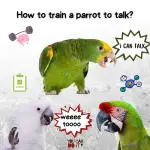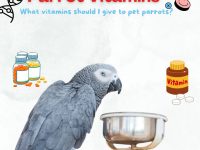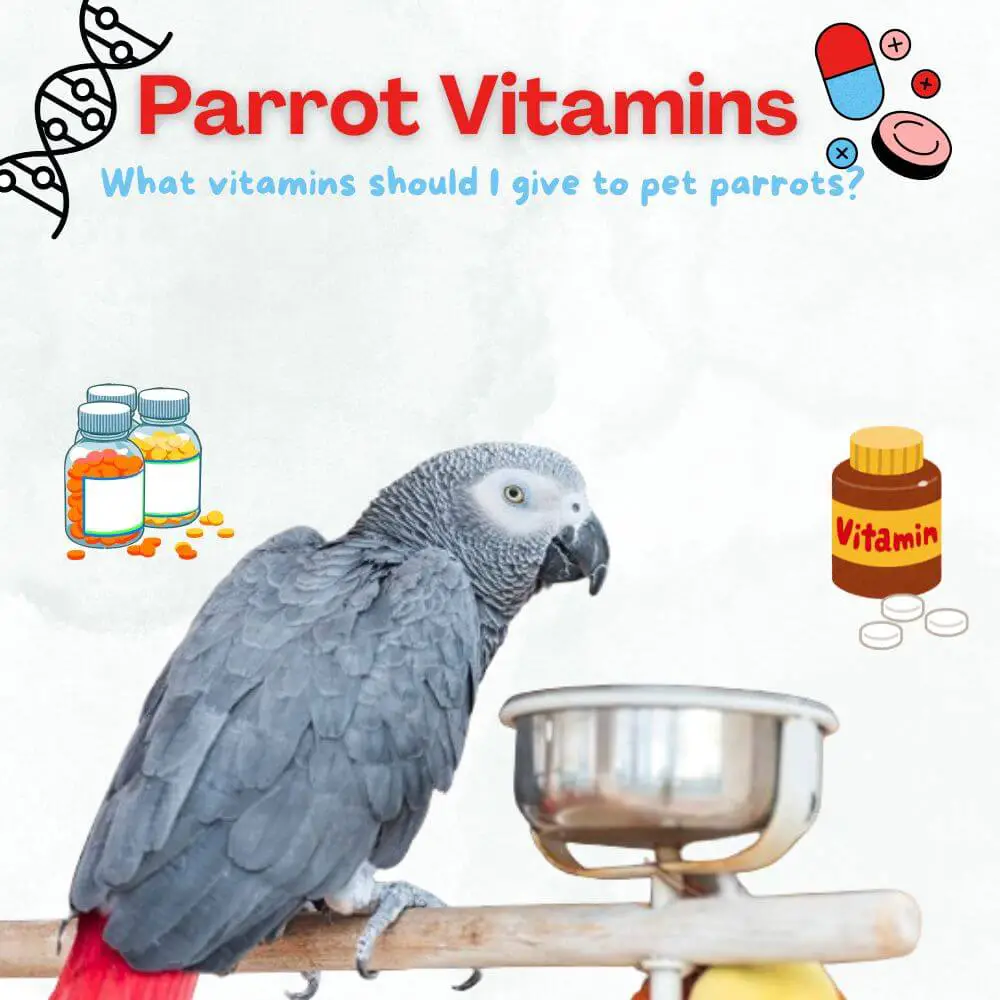 Parrot Vitamins: The diet we give our pets is a key element in their good health and well-being. This is particularly the case for birds, such as parakeets, parrots, etc. With a balanced diet adapted to their needs, you ensure that they are in the best possible shape.
Parrot Vitamins: The diet we give our pets is a key element in their good health and well-being. This is particularly the case for birds, such as parakeets, parrots, etc. With a balanced diet adapted to their needs, you ensure that they are in the best possible shape.
However, certain times of the year are conducive to the onset of fatigue and a drop in vitality in our little parrots. The intake of vitamins is then a good way to help them regain their energy. Here are the vitamins for Parrots that are important for their well-being.
Why give vitamins to pet parrots?
When a parrot is healthy, you can immediately see it from its behavior and appearance:
- he is active in his cage (or outside if you let him out), and he is vocally expressive by singing or talking depending on the species.
- Its plumage has beautiful colors, it is shiny and smooth.
There are times of the year when the fitness of our dear birds drops a little. You will notice a decrease in activity, fatigue, and duller and slightly ruffled plumage.
When is a parrot likely to be more tired?
- a change of season.
- a molting period: the loss of old feathers and the growth of new ones results in
- significant energy expenditure in the parrot, which will consequently be more tired and weaker.
- a breeding period.
- a period of growth for a young parrot.
- a period of recovery after an illness.
In these situations, the parrot food you usually provide is not always enough to invigorate him. It is then useful to add essential vitamins to his diet for his recovery.
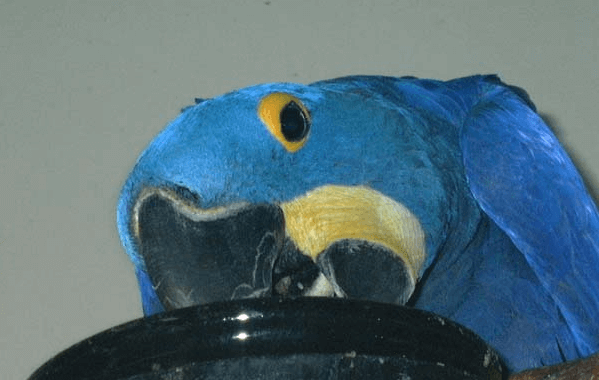
What vitamins are for your parrots?
Like other animal species, vitamins are essential for maintaining good health in parrots. Here are the main vitamins required by parrots.
- Vitamin A is important for the immune system of birds. It contributes to bone growth and the formation of beautiful plumage with healthy skin. It also protects the mucous membranes.
- Vitamin B has several forms: B1, B2… Up to B12. In general, the B vitamin family maintains a good metabolism and a good nervous system.
- Vitamin C acts on the immune system and has antioxidant properties. It ensures good hormonal balance. It is even more important when a parrot is sick or stressed.
- Vitamin D is essential for bone formation and quality as well as the absorption of calcium and phosphorus.
- Vitamin E has important antioxidant properties against free radicals and plays a role in protecting cells. It also acts on the quality of muscles.
The consequences of a lack of vitamins
When a vitamin is not present in sufficient quantities in a parrot’s daily diet, it leads to deficiencies. Its deficiencies are the cause of health problems.
- Vitamin A deficiency: weakening of the immune system, respiratory problems, dry skin, the parrot is prone to infections and abscesses. This is the main vitamin deficiency found in seed-eating parrots.
- Vitamin B deficiency: neurological problems, cramps, stunted growth. It is also one of the most common vitamin deficiencies.
- Vitamin C deficiency: weakening of the immune system, bone growth problems, poor healing.
- Vitamin D deficiency: bone problems, tremors.
- Vitamin E deficiency: muscle disorders.
Since parrots do not produce vitamins C and D directly, they are supplied from outside. This is mainly through food of course, but also vitamin supplements if necessary and, for vitamin D, from the sun’s rays.
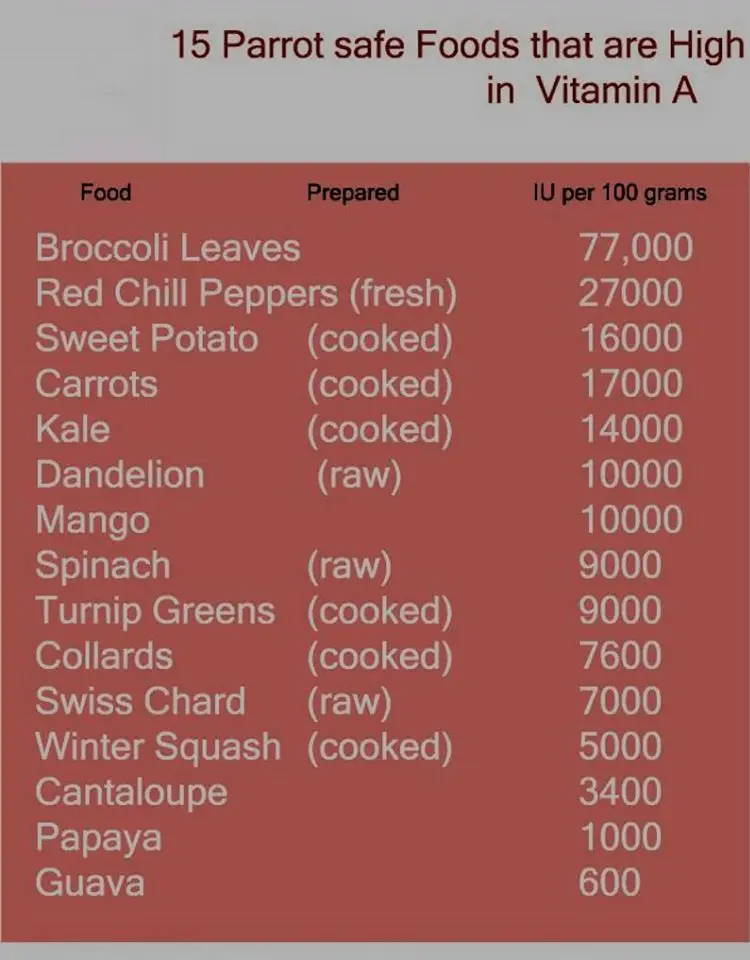
Vitamin supplements
Your veterinarian will advise you whether your little companions need a vitamin supplement based on their situation. They will provide you with food supplements containing these vitamins and advise you on the frequency of their use.
Many of these products come in liquid form, to be added to the parrots’ drinking water. Others are to be mixed with the usual food. Not all supplements are always valid for all parrot species. Some are suitable for passerines, others are more suitable for parrots and parakeets.
In all cases, follow your veterinarian’s prescription carefully.
it happens that a parrot turns its nose up at its water when a vitamin supplement is in it. However, daily hydration of a parrot is essential to its health. Also, to make it want to drink again, add to its drinking water, as desired, a little sugar, honey or fruit juice. These ingredients mask the taste of vitamin products. Contact your veterinarian if the parrot still refuses to drink.
How to avoid vitamin deficiency?
Apart from the times when you give your parrot a vitamin supplement, a varied and suitable diet is enough, daily, to provide it with the vitamins it needs.
The staple diet of pet parrots is seed mix. It can include millet, canary seed, oats, sunflower, flax, peanuts…
In your pet store, you will find balanced food products, often designed to meet the nutritional needs of each species of parrot.
For example, there are different types of seed mixes: exotic parrots, parakeets, and parrots.
Want to know more? Find out how to properly feed your pet parrots.
In addition, parrot food also includes a portion of fresh vegetables and fruits. They represent an important source of vitamins! Ask your veterinarian or our in-store advisors about the vegetables and fruits authorized for each species of parrot. Discover our advice on prohibited food for parrots.
A dietary supplement
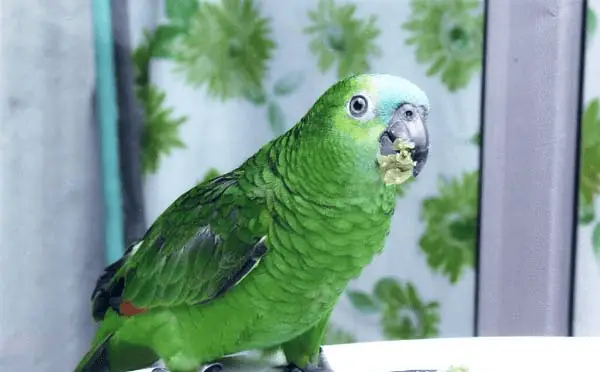
In addition to this basic diet, do not hesitate to place a parrot food supplement in the cage. Available in different forms, the food supplement not only pleases the parrot but also provides it with the vitamins and minerals it needs.
- Millet cluster: parrots like it! It provides them with vitamins, minerals, and energy daily.
- Fortifying egg food: this is an essential supplement to always have at home! During periods of parrot fatigue, the food provides a lot of nutrients, vitamins, and proteins. It allows good feather growth during molting and helps the parrot regain its energy.
- Insect paste: it plays the same role as the previous one but for insectivorous parrots.
- The pecking stone: here again, this is a very interesting food supplement for parrots. Composed of grit, gravel, or marine corals, it represents a source of trace elements and helps good digestion.
- Cuttlefish bone: it provides the parrot with calcium and minerals.
The sweets
Giving a parrot treat is a good idea to please your little protégé. The condition is to choose it well so that it constitutes a good complement to its daily food.
Parrot treats usually come in the form of sticks or snacks to hang inside the cage. They consist of cereals, plants, vegetables, fruits, oilseeds, honey… And are sometimes enriched with vitamins.
These sticks have another advantage, that of maintaining the parrots’ beaks.
So, vitamins are therefore necessary elements for the good health of parrots. With a suitable basic diet and food supplements used wisely, your parrot will not suffer from deficiencies and will live happily!
related article:

